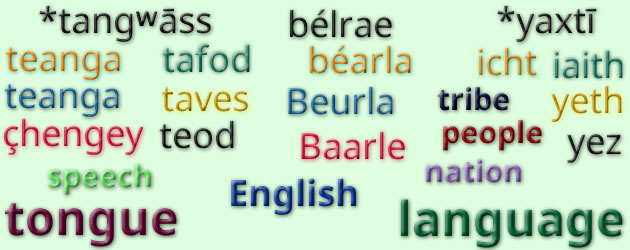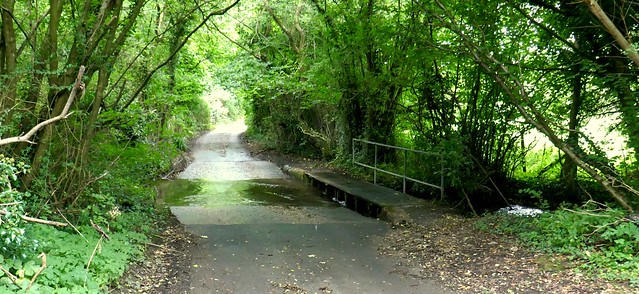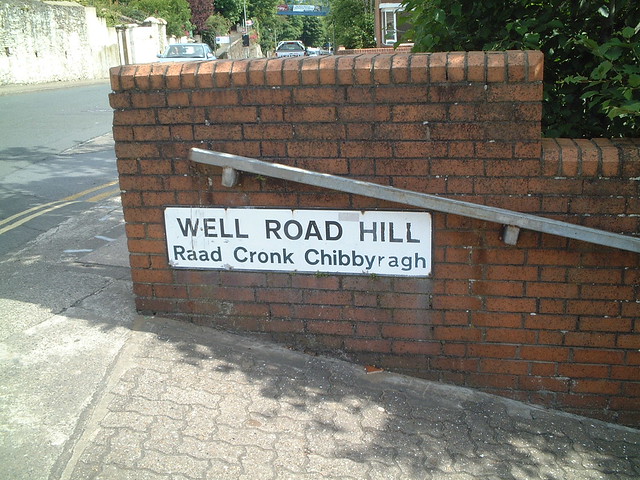Words for sea, ocean and related things in Celtic languages.
Words marked with a * are reconstructions.
| Proto-Celtic | *mori = sea |
|---|---|
| Primitive Irish | *ᚋᚑᚏᚔᚅ (*morin) = sea |
| Old Irish (Goídelc) | muir [murʲ] = sea muirbolc = inlet romuir = ocean, sea |
| Middle Irish (Gaoidhleag) | muir = the sea, ocean |
| Irish (Gaeilge) | muir [mˠɪɾʲ] = sea muirbhealach = sea route, seaway muirbhrúcht = tidal wave, (sea) eruption, invasion (by sea) muirí = marine, maritime muireolaí = oceanographer muireolaíicht = oceanography |
| Scottish Gaelic (Gàidhlig) | muir [murʲ] = sea muireil [murʲal] = maritime muir-acainneach = seaworthy muir-èolas = hydrography muir-làn = high water/tide muir-thìreach = amphibious muir-tràghadh = low tide, low-water |
| Manx (Gaelg) | mooir = sea mooiroil = marine mooiragh = dune, estuary, maritime, mariner mooir-oaylleeaght = oceanography mooir-lane = high tide mooir-hraie = low tide |
| Proto-Brythonic | *mor = sea |
| Middle Welsh (Kymraec) | mor, myr, mŷr = sea, ocean morad, mor-rad = produce of the sea morawl = sea-inlet, estuary morben = promontory, headland, cape, coast, sea-shore, isthmus moravl, morawl = marine, maritime, naval kefn[f]or, kefynvor = ocean, the main flood |
| Welsh (Cymraeg) | môr [moːr] = sea, ocean, the deep; plenty, abundance, copiousness morad = produce of the sea, revenue accruing from the sea, custom(s) moraf, mori = to anchor (a boat) morafl = sea-inlet, estuary morben = promontory, headland, cape, coast, sea-shore, isthmus morol = marine, maritime, naval cefnfor = ocean, the main flood |
| Middle Cornish | mor = sea morec = of the sea, maritime morhoch = porpoise morlenol = tide, influx of the sea mortrig = the ebb of the sea morva = a place near the sea, marsh morvil = whale morvoren = mermaid |
| Cornish (Kernewek) | mor = sea mor bras, mor broas = ocean mora = to put to sea mordardha = to surf mordrik = low tide mordu = navy morek = maritime morvil = whale morvoren = mermaid |
| Middle Breton | mor = sea mor-bras = ocean |
| Breton (Brezhoneg) | mor [ˈmoːr] = sea, tide mor-bras = ocean morad = tide moraer [mo’raɛr] = marine, navigator, boatman morañ [ˈmoːrã] = to launch, to set afloat (a ship) morlaer [ˈmorlaɛr] = pirate morlu [ˈmorly] = fleet, navy morour [ˈmoː.rur] = oceanologist morvil [ˈmor.vil] = whale, cetacean |
Etymology: from the Proto-Indo-European móri (sea, standing water), from *mer- (sea, lake, wetland), which is also the root for the English word mere, as in Windermere [source].
| Old Irish (Goídelc) | fairrge [ˈfar͈ɡʲe] = ocean, sea |
|---|---|
| Middle Irish (Gaoidhleag) | fairrge, fairge = the open sea, ocean, extent, expanse |
| Irish (Gaeilge) | farraige [ˈfˠaɾˠɪɟɪ] = sea, billow, swell farraigeach = seaman, seafarer farraigeoireacht = (act of) seafaring |
| Scottish Gaelic (Gàidhlig) | fairge [farʲagʲə] = sea, ocean, (sea) swell, turbulence of the ocean |
| Manx (Gaelg) | faarkey [ˈføːɹkə] = sea, ocean, billow, breaker, large wave, swell |
Etymology: possibly related to Old Irish fairsiung (ample, broad) [source].
| Proto-Celtic | *kawnos = port, haven |
|---|---|
| Old Irish (Goídelc) | cúan [kuːa̯n] = ocean, sea |
| Middle Irish (Gaoidhleag) | cúan = bay, gulf, harbour |
| Irish (Gaeilge) | cuan [kuən̪ˠ] = haven, harbour, bow, curve, bowed, stooped |
| Scottish Gaelic (Gàidhlig) | cuan [kuən] = ocean, bay, inlet (archaic), haven (archaic) cuan-eòlaiche = oceanographer cuan-eòlas = oceanography |
| Manx (Gaelg) | keayn [kiᵈn] = sea, ocean |
Etymology: from Proto-Indo-European *kapno-, *keh₂p- (to grasp) [source].
| Proto-Celtic | *liros = sea, ocean |
|---|---|
| Old Irish (Goídelc) | ler [ˈl͈ʲer] = ocean, sea |
| Middle Irish (Gaoidhleag) | ler, lera = sea, ocean |
| Irish (Gaeilge) | lear [l̠ʲaɾˠ] = sea, ocean (literary/archaic) thar lear = overseas, abroad, across/beyond the sea |
| Scottish Gaelic (Gàidhlig) | lear [l̪ʲɛr] = sea, ocean (poetic) thar lear = overseas (poetic) |
| Old Welsh (Kembraec) | lirou = sea, ocean |
| Middle Welsh (Kymraec) | llyr = sea, ocean llyryed = to sail, voyage |
| Welsh (Cymraeg) | llŷr = sea, ocean, watercourse, channel llyriaf, llyrio = to sail, voyage |
Etymology: either borrowed from an unknown substrate language or from Proto-Indo-European *leyH- [source].
| Middle Welsh (Kymraec) | gueilgi, gweilgi = sea, ocean, the deep; flood, torrent |
|---|---|
| Welsh (Cymraeg) | gweilgi = sea, ocean, the deep; flood, torrent |
Etymology: from Proto-Celtic *wailos (wolf, howler) and Welsh ci (dog), perhaps because the sound of the sea was likened to a wolf howling, or the sea was seen as like a wolf. It is cognate with the Irish faolchú (wild dog, wolf), and the Scottish Gaelic faol-chù (wolf) [source].
Sources: Wiktionary, Am Faclair Beag, Online Manx Dictionary, Teanglann.ie, eDIL – Electronic Dictionary of the Irish Language, In Dúil Bélrai English – Old Irish glossary, Geiriadur Prifysgol Cymru, Gerlyver Kernewek, Lexicon Cornu-britannicum: A Dictionary of the Ancient Celtic Language of Cornwall, Dictionaire Favereau, TermOfis, Le dictionnaire diachronique du breton, Etymological Dictionary Of Proto Celtic










